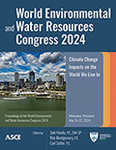Flood Risk Assessment Using Flood Risk Map and Grid Based Data
Publication: World Environmental and Water Resources Congress 2024
ABSTRACT
The increasing risk of flooding in urban areas has led to many flood risk assessments. However, existing risk assessment methods are unable to select and reflect only the damage target and estimate a biased risk index due to data bias. Therefore, this study estimated flood risk index based on an indicator-based approach (IBA) using flood risk maps and grid data for 44 cities in South Korea. For each city, we used the overlapping grid data with the flood risk map. In addition, we divided the distribution of the data into 10 quantiles and scored the data according to each interval. Finally, the flood risk index was calculated based on entropy and Euclidean distance weights. Comparing the results between the estimated flood risk index and the flood damage data for 2019 shows an improvement over the existing methods. It is believed that the proposed method can accurately identify the flood risk, but also be used to support the decision-making process.
Get full access to this chapter
View all available purchase options and get full access to this chapter.
REFERENCES
Cai, H., Lam, N. S. N., Zou, L., Qiang, Y., and Li, K. (2016). Assessing community resilience to coastal hazards in the Lower Mississippi River Basin. Water-Sui, 8(2), 46.
Dewan, A. M., Yamaguchi, Y., and Rahman, Z. (2012). Dynamics of land use/cover changes and the analysis of landscape fragmentation in Dhaka Metropolitan, Bangladesh. GeoJournal, 77(3), 315–330.
Fekete, A. (2009). Validation of a social Vulnerability index in context to river-floods in Germany. Nat Hazard Earth Sys, 9(2), 393–403.
Fernandez, P., Mourato, S., and Moreira, M. (2016). Social vulnerability assessment of flood risk using GIS-based multicriteria decision analysis. A case study of Vila Nova de Gaia (Portugal). Geomat Nat Haz Risk, 7(4), 1367–1389.
Freire, S., MacManus, K., Pesaresi, M., Doxsey-Whitfield, E., and Mills, J. (2016). Development of new open and free multi-temporal global population grids at 250 m resolution. Population, 250.
Hammond, M. J., Chen, A. S., Djordjević, S., Butler, D., and Mark, O. (2015). Urban flood impact assessment: A state-of-the-art review. Urban Water J, 12(1), 14–29.
Hwang, B., Lee, J., Kim, D., and Kim, J. (2021). A Study on the Use of Grid-based Spatial Information for Response to Typhoons. KOSDI, 17(1), 25–38.
Jelinek, S., Milošević, P., Rakićević, A., and Petrović, B. (2021, August). Forecasting Sovereign Credit Ratings Using Differential Evolution and Logic Aggregation in IBA Framework. In International Conference on Intelligent and Fuzzy Systems (pp. 506–513). Springer, Cham.
Joo, H., Choi, C., Kim, J., Kim, D., Kim, S., and Kim, H. S. (2019). A Bayesian network-based integrated for flood risk assessment (InFRA). Sustainability, 11(13), 3733.
Kim, J., Kim, D., Lee, M., Han, H., and Kim, H. S. (2022). Determining the Risk Level of Heavy Rain Damage by Region in South Korea. Water-Sui, 14(2), 219.
Lee, S., Choi, Y., and Yi, J. (2020). Urban Flood Vulnerability Assessment Using the Entropy Weight Method. KOSHAM, 20(6), 389–397.
Lyu, H. M., Sun, W. J., Shen, S. L., and Arulrajah, A. (2018). Flood risk assessment in metro systems of mega-cities using a GIS-based modeling approach. Sci Total Environ, 626, 1012–1025.
Park, K., and Lee, M. H. (2019). The development and application of the urban flood risk assessment model for reflecting upon urban planning elements. Water-Sui, 11(5), 920.
Wang, W. J., Kim, D., Yoo, Y., Lee, J., Kim, K. T., and Kim, H. S. (2021). Support for Decision-Making on the Resilience of Incheon Metropolitan City Using Flood Risk Assessment. KOSHAM, 21, 197–210.
Wang, W. J., Kim, S., Kim, K. T., Lee, C., and Kim, H. S. (2020). Analysis of Applicability of Grid-based Spatial Analysis Data for Flood Risk Assessment. KOSHAM, 20(6), 399–406.
Ying, X., Ni, T., Lu, M., Li, Z., Lu, Y., Bamisile, O., and Pelling, M. (2023). Sub-catchment-based urban flood risk assessment with a multi-index fuzzy evaluation approach: a case study of Jinjiang district, China. Geomatics, Natural Hazards and Risk, 14(1), 2182173.
Yu, I., Kim, H., and Jeong, S. (2018). Grid-Based Flood Risk Mapping Considering Indices of Regional Characteristics. KOSHAM, 18(7), 513–524.
Information & Authors
Information
Published In
History
Published online: May 16, 2024
ASCE Technical Topics:
- Disaster risk management
- Disasters and hazards
- Engineering fundamentals
- Engineering mechanics
- Entropy methods
- Floods
- Geomatics
- Grid systems
- Hydrologic data
- Hydrologic engineering
- Hydrology
- Infrastructure
- Mapping
- Natural disasters
- Risk management
- Surveying methods
- Systems engineering
- Systems management
- Thermodynamics
- Urban and regional development
- Urban areas
- Water and water resources
Authors
Metrics & Citations
Metrics
Citations
Download citation
If you have the appropriate software installed, you can download article citation data to the citation manager of your choice. Simply select your manager software from the list below and click Download.
